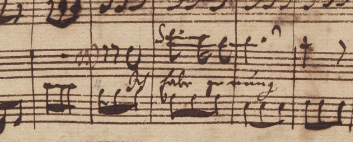Page Category: Bach Cantatas
Cantata BWV 89Was soll ich aus dir machen, Ephraim?
Playlist
Translation
Analysis
A note on translation, Movement 4. The German is "Wenn ich zu ihm, als des Gesetzes Ende", which literally means "When I to him [turn], as the law's end". This sense of Jesus being the 'end of law' is to be found in Romans 10:4, "For Christ is the end of the law for righteousness to every one that believeth." In more modern translations of the Bible, this verse is variously rendered as "For Christ is the end of the law, with the result that there is righteousness for everyone who believes" (New English Translation) or "But Christ makes the Law no longer necessary for those who become acceptable to God by faith" (Contemporary English Version). It is a nice theological point, however, since the verse has also been rendered as 'Christ is the culmination of the law' or 'Christ gives full meaning to the law'. Bear in mind, too, Matthew 5, v. 17: "Do not think that I have come to abolish the Law or the Prophets; I have not come to abolish them but to fulfill them". [...]
Cantata BWV 88Siehe, ich will viel Fischer aussenden
Playlist
Translation
Analysis
There are 8 tracks in the playlist, but only seven movements listed in the translation: that's because Suzuki splits the fourth movement into two separate tracks, one lasting all of 16 seconds! It's why his track 5 is (uniquely!) accessed via a hyperlink within Movement 4's text, rather than only by the movement's heading. [...]
Cantata BWV 87Bisher habt ihr nichts gebeten in meinem Namen
Playlist
Translation
Analysis
Back to Main Catalogue Bach Translations and Notes are copyright © Howard Rogers 2020, All Rights Reserved [...]Cantata BWV 86Wahrlich, wahrlich, ich sage euch
Playlist
Complete Performance
Translation
Analysis
Back to Main Catalogue Bach Translations and Notes are copyright © Howard Rogers 2020, All Rights Reserved [...]Cantata BWV 85Ich bin ein guter Hirt
Playlist
Translation
Analysis
Back to Main Catalogue Bach Translations and Notes are copyright © Howard Rogers 2020, All Rights Reserved [...]Cantata BWV 84Ich bin vergnügt mit meinem Glücke
Playlist
Complete Performance
Translation
Analysis
Back to Main Catalogue Bach Translations and Notes are copyright © Howard Rogers 2020, All Rights Reserved [...]Cantata BWV 83Erfreute Zeit im neuen Bunde
Playlist
Complete Performance
Translation
Analysis
Back to Main Catalogue Bach Translations and Notes are copyright © Howard Rogers 2020, All Rights Reserved [...]Cantata BWV 82Ich habe genung
Playlist
Complete Performance
Translation
Analysis
There is some debate as to whether the words are 'Ich habe genug' or 'Ich habe genung' (as here presented). Genug is the modern German for 'enough' (as in 'he has money enough' or 'that's enough, thank you!') and many Bach cantata listings or articles will cite it as 'genug' (see, for example, this one or this one), but it's definitely written in the original manuscript as 'genug', with the extra 'n': [...]
Cantata BWV 81Jesus schläft, was soll ich hoffen?
Playlist
Complete Performance
Translation
Analysis
Back to Main Catalogue Bach Translations and Notes are copyright © Howard Rogers 2020, All Rights Reserved [...]Cantata BWV 80Ein' feste Burg ist unser Gott
Playlist
Translation
Analysis
This is a complicated libretto! Movements 1, 5 and 8 are verbatim versions of verses 1, 3 and 4 of the original Luther Hymn (so are here represented in their 19th Century English Translation by Frederic Henry Hedge. Movement 2 is also a verbatim transcription from the hymn (this time, verse 2), but is interspersed with text by Salomon Franck (who also wrote the rest of the non-Hymn text). For this verse, therefore, the Hymn text appears in Hedge's English translation (sung by the Soprano, and in italic text), whereas Franck's new text is 'freshly translated' by yours truly. [...]
